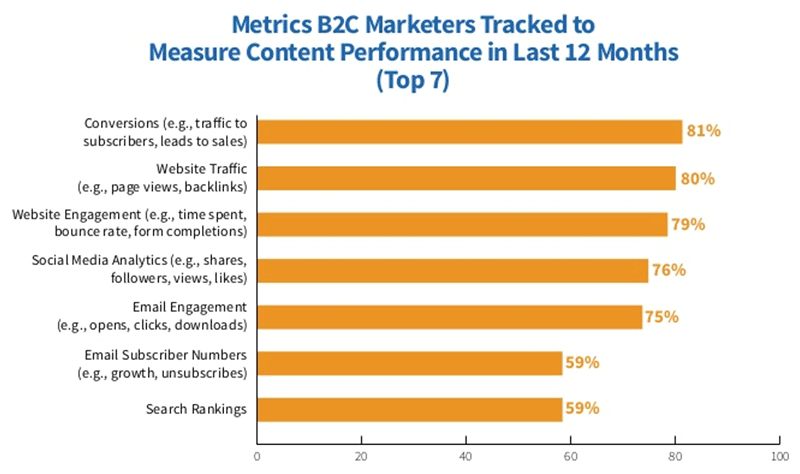Just like in the real world, you’ll be lost without a roadmap to guide your content marketing. Content marketing can be a complex initiative, one that requires a thoughtful strategy and thorough content planning. Your content marketing roadmap should act as your compass as you navigate your way to delivering impactful content that converts.
But where should you start on your journey? Let’s find out.
Plotting Your Roadmap: Start with an Assessment
To get to where you want to go with content marketing, you have to take a hard look at where you are now. A content assessment includes looking at all your efforts holistically. You can start with a content audit.
A content audit is more than just looking at the topics you’ve covered; it involves digging deep into content analytics to determine what type of content performs the best. Based on your analysis, you should be able to identify the strengths and weaknesses of your content strategy.
Alignment Between Goals and Content
In this assessment, you’ll also want to define the key indicators that establish alignment between your content marketing efforts and business goals. For example, if a business goal is to diversify into a new vertical, then your assessment should uncover ways for you to incorporate your organizational knowledge about that industry. Your corresponding content marketing goal would be to develop new topics that will speak to those buyers.
Your SEO Strategy
Your content audit should also include a review of your keyword strategy. Revisiting your SEO objectives is vital to your content marketing roadmap. You’re not creating content solely for search engines. Instead, you are developing content that has value to its audience and employs SEO best practices. Assessing where you stand and building on your keyword focuses are imperative to guiding how and what you develop.
The most crucial parts of building your content marketing roadmap are your content strategy and content plan. They are different but connected. Your content strategy includes your vision that informs the essence of everything you create. A content plan is how to execute on this. They are both foundations for your roadmap.
If these already exist, then it’s time to revisit them and consider what’s changed since they were created. Right now, priorities and challenges have changed for most businesses, as the world’s economies are up against an obstacle hard to overcome, an international health crisis. Many different factors can disrupt your industry, so it’s time to rethink your content objectives.
After reevaluating your content strategy, you’ll need to update your content plan. Your plan should incorporate any factors that will affect your content projects, including micro and macro influences.
Next Stop: Channels for Your Content Marketing
The next stop on your content marketing roadmap should be identifying the best channels to distribute your content. You have channels that you own and those that you do not. Both are important in amplifying your content’s reach.
- Channels you own: You dictate how the content looks and how it’s positioned (i.e., website, blog, landing pages and email)
- Channels you earn: This segment describes relationships you leverage (i.e., media, influencers, etc.).
- Channels you pay to use: Any dollar spent on a platform to drive interest to your content (i.e., Google Ads, paid social media ads, digital ads on other websites)
- Channels you share: In this subset, you are using platforms where you have some control but are not a true owner of the application (i.e., all social media sites, partner or customer referrals).
Each channel can play a crucial role in getting your content in front of the right audience. Choosing which channels to leverage includes:
- Looking at the current performance on channels
- Your budget
- Where your audience seeks to find information
- Your ability to automate channel distribution (i.e., using a content marketing platform to publish posts automatically)
Pause for Directions: Are You Mapping Content to the Buyer’s Journey?
The next phase of your content marketing roadmap should include how you are aligning content with the buyer’s journey. There are many ways to create a customer journey map. It involves segmenting your audience, defining the touch points, considering user intent and identifying pain points.
Consider it a map inside your map. There are three main stages in the buyer’s journey: Awareness, Consideration and Decision.
Image Source: CrazyEgg
Your roadmap should organize the types of content that make sense with each phase. For example, in the Awareness stage, the buyer is beginning to seek out answers to a question, so information-focused blogs work well here; whereas in the Decision phase, customers are ready to buy, so a comparison against competitors would make sense here.
More for Your Mileage: Measuring Content Performance and Determining ROI
As the winding path continues for your content marketing efforts, the next essential part of your roadmap is how and what to measure.
You may already have content performance metrics, but are they providing you the best insights? And if they do, how are you charting out your responses?
You need to ensure that your initiatives are delivering a return on investment (ROI). That means you’ll need to be able to track a content’s ability to drive engagement and conversions. Metrics to consider include these recommendations based on a Content Marketing Institute survey:
Image Source: CMI
By focusing on these performance metrics, you can determine how valuable your content is to your audience. You’ll also begin to see patterns and trends that can influence what you do next. If your infographics have high page views and show high engagement on social media, then you should incorporate more into your content calendar.
Your Roadmap’s Home Base
Your content marketing roadmap will evolve and change, just like any journey. To ensure that your roadmap is always pointing to the right goals, you need to have a platform that supports all aspects of content marketing like DivvyHQ. Explore its features and benefits by trying it for free.



